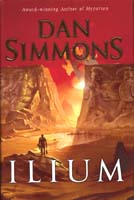 Ilium
Ilium
by Dan Simmons
A book review by Mark L. Olson
Eos, 2003, $25.95, 576 pp
This is an extraordinarily frustrating book. It's frustrating because it's half of one of the best pieces of SF I've read recently. It's not the first books of a series, it's the first volume of a single novel in two volumes and it breaks off in mid-action with nothing resolved.
The world of Ilium is fascinating and half-way through the story it is far from clear where Simmons is ultimately going.
The action interweaves between three threads in the far future: One follows Thomas Hockenberry, a professor from university in Indiana right around today. For the past decade or so, he's been observing the Trojan War, but it's not our Trojan War, it's Homer's: it has gods (with real power) and Heroes with abilities far beyond other men's, huge armies – the Greeks have 100,000 men – and Ilium itself, the greatest city in the world with impregnable walls and nearly topless towers. Hockenberry is equipped with tools which allow him to observe unseen. Action shifts between Ilium (which seems to be on Earth) and Mt. Olympus which is definitely on a Mars which has been terraformed by millions of little green men.
The second thread is on a future Earth and involves a half-dozen or so people who seem to be Eloi (though there apparently aren't any Morlocks). This Earth has about a million people who live lives of luxury served by servitors (robots, apparently) and the voynix, apparently intelligent aliens who do all manual labor and guard the humans, but who never communicate with them.
There's a lot to guard them from, since most of Earth's surface is abandoned and roamed by prehistoric beasts recreated by genetic engineering thousands of years previously. North America is inhabited by dinosaurs, while South America's pre-Isthmus flightless-bird dominated fauna is back. This world was created by the post-humans who kept a breeding population of old humans around, but abandoned the old humans and Earth itself over a thousand years earlier.
These people have lost nearly all their knowledge – reading is a rare skill – and have slowly even been losing knowledge of how to use the gadgetry around them. (They have even lost geography. Their world is places connected by a teleportation net and a few miles around each of those spots – the rest of the world is a mystery no one cares about.) Their life is a social whirl with no cares and no need to know anything beyond purely social skills.
The final thread follows two intelligent robots – moravecs – from the moons of Jupiter. Their ancestors were sent there by the post-humans and the moravecs have built up a civilization in the long years since the post-humans left. The moravecs are closer to us today than the Eloi on Earth, since they have carefully preserved and cherished Earth's ancient culture – the moravec who is the viewpoint character works in Europa's deep oceans, but its real love is Shakespeare scholarship.
The moravecs have noticed the terraforming of Mars and have noticed a huge amount of quantum teleportation activity over the last decade and resolve to investigate, and we follow the team of moravecs as they head to Mars.
The three threads intertwine to some extent in this volume – Hockenberry and the moravecs have meet up by the end of the book -- but there is as yet no explanation for how the Odysseus fighting at Ilium is related to the Odysseus leading the party of old-Humans in the second thread.
Wonders abound: Just what are the gods of Olympus Mons? Who set up this Trojan War and why does only Zeus of all the gods seem to know that this is a recreation? Who is Prospero and why is Mars covered with Easter-Island-like portrait busts of him? What happened to the post-Humans?
If Simmons can keep this up, Ilium will be a great SF novel.
I was amused at the cliff-hangers with which Simmons ends nearly every chapter. And these aren't half-hearted cliff-hangers, but more on the order of "Frodo was alive and taken by the Enemy." He must have really worked hard to create so many.
(I'm appalled that half a book has gotten a Hugo nomination, though, and as much as I enjoyed it, I will vote it below No Award. If the second half lives up to the first, I'll nominate the whole thing next year.)
NESFA homepage | Review Index | More Reviews by Mark L. Olson
